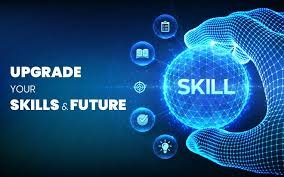
The Continuous Upgrade: Why Upskilling is Your Only Path to Career Security
The Continuous Upgrade: Why Upskilling is Your Only Path to Career Security
The traditional career path—learn a trade, get a job, climb the ladder for forty years—is obsolete. We now live in an era where the shelf life of a technical skill is shrinking faster than ever before. New technologies like AI, machine learning, and advanced automation are not just changing how we work; they are fundamentally redefining what work is.
In this dynamic, demanding landscape, one concept has emerged as the non-negotiable key to professional survival and success: upskilling.
Upskilling is the process of learning new skills or enhancing existing ones to advance in your current career path, allowing you to stay competitive and effective as your industry evolves. It is your personal, continuous upgrade, and it is the single most important investment you can make in your professional future.
For every professional, from the entry-level analyst to the seasoned executive, embracing a mindset of continuous learning is no longer a "nice-to-have"—it is a mandatory requirement for maintaining relevance and ensuring job security.
1. The Imperative of Automation: Future-Proofing Your Role
The primary driver behind the need for upskilling is technological acceleration. According to the World Economic Forum, while automation is set to displace millions of existing jobs, it will simultaneously create an even greater number of new roles. The catch? These new roles require skills the current workforce often lacks.
-
Automation Replaces the Repetitive: Algorithms and software excel at routine, data-heavy tasks. If a significant part of your job involves predictable, rules-based work (like data entry, basic analysis, or standard reporting), you are exposed to automation risk.
-
Upskilling Empowers the Analytical: Upskilling in areas like advanced data analysis, machine learning tools, or process optimization allows you to move beyond the repetitive tasks. You shift from being a data gatherer to a data strategist—a role that requires the human ingenuity and critical thinking that technology cannot replicate.
-
The Skills Gap: Industries across the board, particularly tech, finance, and healthcare, are dealing with a critical skills gap. By upskilling, you don't just protect your job; you position yourself to fill these high-demand, high-value roles that companies are actively struggling to staff.
2. The Direct Path to Career Advancement and Earning Potential
From a purely personal and financial standpoint, upskilling is the most direct way to achieve career mobility and increase your salary.
-
Internal Mobility and Promotion: Companies prefer to promote from within—but only if their employees demonstrate the capacity for growth. By proactively mastering the skills needed for the next level up (e.g., advanced budgeting for a financial role, or complex project management for a lead role), you signal your readiness for promotion. Upskilling shows initiative, a leadership quality that managers look for.
-
Increased Earning Potential: Skills that are rare, specialized, and in high demand command a premium. Acquiring a certification in a cloud computing platform (like AWS or Azure), or demonstrating proficiency in a specialized coding language (like R or Scala), makes you a more valuable asset in the open market. Your increased value translates directly into higher earning potential and stronger leverage during salary negotiations.
-
Job Security and Employability: In a volatile economy, the individual with the broadest, most current, and most specialized skillset is the most secure. An upskilled professional remains highly competitive and adaptable, making them an indispensable resource to their current employer and a prime candidate for future employers.
3. Fostering a Growth Mindset and Resilience
Beyond the tangible career benefits, upskilling provides significant psychological and professional advantages that strengthen your long-term resilience.
-
Boosted Confidence: Learning a difficult new skill—and successfully applying it—provides a massive boost to self-efficacy. This confidence translates into a more assertive approach to problem-solving, better communication with stakeholders, and a greater willingness to take on challenging, high-visibility projects.
-
Enhanced Adaptability: The act of continuous learning trains your brain to be agile. Every new course, every new certification, and every new project refines your ability to absorb information and adapt to new environments. This adaptability is the single most important "soft skill" in a rapidly changing world. Upskilled individuals are less likely to be paralyzed by change; they see it as an opportunity.
-
Increased Job Satisfaction: Stagnation is often a leading cause of job dissatisfaction and burnout. When you are actively learning and applying new knowledge, your work remains stimulating and engaging. You feel valued because you are visibly growing, which creates a positive feedback loop of motivation and achievement.
How to Make Upskilling an Actionable Strategy
Upskilling doesn't have to mean enrolling in an expensive, multi-year degree program. The modern learning landscape is flexible and accessible.
-
Identify the Gaps: Look at job descriptions for the role you want in three years. Compare those requirements to your current skills. The difference is your gap. Prioritize skills based on high demand (AI, data analytics, cloud computing) and direct relevance to your next career step.
-
Utilize Flexible Resources: Leverage online learning platforms like Coursera, edX, LinkedIn Learning, or specific industry certifications (e.g., Google Analytics, PMI, Microsoft certifications). Dedicate 3-5 hours per week to focused learning.
-
Apply and Prove: Never let a new skill remain theoretical. Apply it to a small personal project, volunteer for a related task at work, or create a portfolio piece that demonstrates your new capability. Proof-of-work is the final step in upskilling.
In the modern job market, your career is not a fixed structure; it is a running piece of software that requires regular updates and patches. By viewing upskilling not as a chore but as a continuous strategic investment, you ensure that you remain current, competitive, and fully capable of seizing the opportunities that tomorrow's economy will bring.
FAQs on Upskilling
1. What is the difference between upskilling and reskilling?
Upskilling involves improving or adding to the skills you already use in your current role or field to advance within it (e.g., a Marketing Specialist learning advanced Python for data analysis). Reskilling involves learning an entirely new set of skills to transition to a completely different job or industry (e.g., a Retail Manager learning coding to become a Web Developer). Both are forms of continuous learning, but upskilling focuses on deepening expertise, while reskilling focuses on career pivot.
2. How do I know which skills are most in demand right now?
The most in-demand skills are generally clustered around digital and human-centric capabilities. Focus on:
-
Data & AI Literacy: Data visualization, machine learning concepts, and basic programming (Python/R).
-
Cloud Computing: Certifications in major platforms like AWS, Microsoft Azure, or Google Cloud.
-
Cybersecurity: Understanding basic threat analysis and security protocols.
-
Human-Centric Skills: Critical thinking, complex problem-solving, leadership, and emotional intelligence—skills that remain uniquely human.
3. Does formal education (a degree) count as upskilling?
Yes, a degree counts, but micro-credentials and focused certifications often provide a higher return on investment (ROI) for upskilling. A degree provides a broad foundation, but the fast-paced nature of modern technology means that focused, short-term courses and certifications are better at delivering the current, in-demand technical skills that lead directly to career advancement and increased pay.




